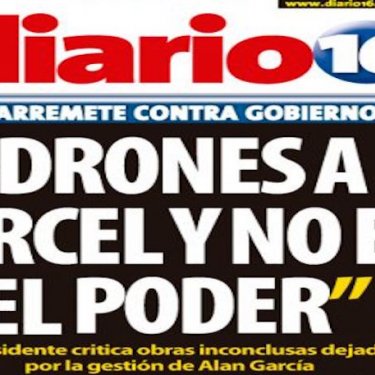After two more prosecutions, RSF urges Peru to decriminalize libel

(Updated on August 11th 2016) Reporters Without Borders welcomes the Fourth Criminal Court of Lima's decision to overturn the defamation conviction against the journalist Fernando Valencia, accused by former President Alan García Pérez.
***********************************************************************
(Published on April 27th 2016) Reporters Without Borders (RSF) condemns the completely disproportionate sanctions involved in two major criminal libel cases, one just concluded and one still pending, and calls on Peru to finally decriminalize media offences.
The first concerns Fernando Valencia Osorio, the former editor of the daily Diario 16, who was given a 20-month suspended jail sentence on 18 April and was ordered to pay the equivalent of 27,000 euros in damages to former President Alan García over a front-page story in Diario 16 in 2014.
The story quoted a statement by President Ollanta Humala accusing the previous (García-led) administration of corruption but not referring to García by name. It was nonetheless accompanied by a photo of García.
The second concerns Rafo León, a columnist and very popular TV presenter who is being sued by Martha Meier Miró Quesada, the former editor of one of Peru’s biggest selling daily El Comercio. Meier Miró Quesada, accuses León of insulting and humiliating her in an opinion piece in the magazine Caretas (the main news magazine of the country) in 2014 that was extremely critical of her editorial methods and one of her columns attacking Lima’s mayor.
Meier Miró Quesada, claims that his opinion piece was partly to blame for her dismissal as El Comercio’s editor in February 2015. León is facing the possibility of a three-year jail sentence and being ordered to pay up to 1.7 million euros in damages. A final decision in the case is expected at a hearing on 3 May.
"We call on the courts to overturn Fernando Valencia’s conviction and dismiss all charges against Rafo León, and we urge the authorities to decriminalize media offences," said Emmanuel Colombié, the head of RSF’s Latin America desk.
"The use of criminal diffamation in these two cases is utterly disproportionate and foster a climate of self-censorship in Peru. They send a very negative signal that discourages journalistic work and they constitute an attack on the fundamental principle of free speech."
Criminal defamation prosecutions of journalists are very common in Peru. The National Association of Journalists (ANP) says it knows of more than 100 cases akin to those of Valencia and León in the past five years and that in each case the jail terms and heavy damages awards had the same goal – to force media outlets to close and to reduce journalists to silence.
Coming amid a presidential election campaign, the two latest cases have been keenly debated in Peru, which is ranked 84th out of 180 countries in RSF’s 2016 World Press Freedom Index.



